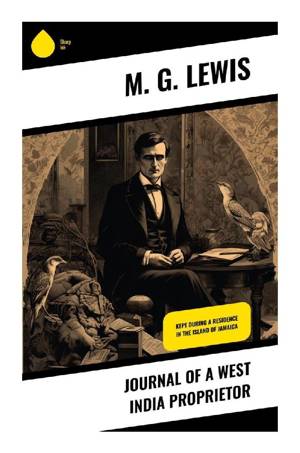
Door een staking bij bpost kan je online bestelling op dit moment iets langer onderweg zijn dan voorzien. Dringend iets nodig? Onze winkels ontvangen jou met open armen!
- Afhalen na 1 uur in een winkel met voorraad
- Gratis thuislevering in België vanaf € 30
- Ruim aanbod met 7 miljoen producten
Door een staking bij bpost kan je online bestelling op dit moment iets langer onderweg zijn dan voorzien. Dringend iets nodig? Onze winkels ontvangen jou met open armen!
- Afhalen na 1 uur in een winkel met voorraad
- Gratis thuislevering in België vanaf € 30
- Ruim aanbod met 7 miljoen producten
Zoeken
Journal of a West India Proprietor
Kept During a Residence in the Island of Jamaica
M. G. Lewis
Paperback | Engels
€ 13,95
+ 27 punten
Omschrijving
In "Journal of a West India Proprietor," M. G. Lewis explores the complexities of colonial life through the eyes of a West Indian plantation owner. This richly detailed narrative employs a blend of travel writing and personal memoir, offering insight into the socio-economic and ethical dilemmas faced by European proprietors during the late 18th century. Lewis's vivid descriptions of the Caribbean landscape, coupled with candid reflections on slavery and colonial exploitation, situate the work within the burgeoning discourse on abolition and cultural identity in the Romantic era. His literary style is marked by a keen sense of observation and irony, revealing the tensions between pleasure and moral responsibility in colonial endeavors. M. G. Lewis, an influential figure of the Gothic novel, is renowned for his engagement with themes of madness, morality, and the interplay between civilization and nature. His own experiences in the Caribbean informed his understanding of the brutal realities of slavery and the often-romanticized notions of colonialism. Lewis's background as a West India proprietor brings an authentic voice to the narrative, making it a significant contribution to the literature of British colonialism. Readers intrigued by the intersections of colonial history, ethics, and personal narrative will find "Journal of a West India Proprietor" an invaluable resource. Lewis's work prompts a critical examination of the implications of colonialism, inviting reflection on the legacies that continue to shape contemporary discussions around race, identity, and morality.
Specificaties
Betrokkenen
- Auteur(s):
- Uitgeverij:
Inhoud
- Aantal bladzijden:
- 300
- Taal:
- Engels
Eigenschappen
- Productcode (EAN):
- 9788028340117
- Uitvoering:
- Paperback
- Afmetingen:
- 152 mm x 229 mm
- Gewicht:
- 418 g

Alleen bij Standaard Boekhandel
+ 27 punten op je klantenkaart van Standaard Boekhandel
Beoordelingen
We publiceren alleen reviews die voldoen aan de voorwaarden voor reviews. Bekijk onze voorwaarden voor reviews.











